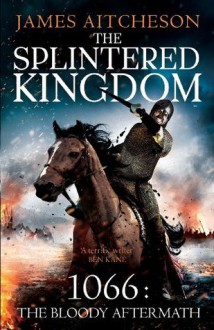
 This book roared out of the gate. Before the end of the first chapter, the reader is thrown into the middle of a battle. Then that battle ends and so does any action in the novel for quite some time. The only thing that kept me reading was the promise of something coming.
This book roared out of the gate. Before the end of the first chapter, the reader is thrown into the middle of a battle. Then that battle ends and so does any action in the novel for quite some time. The only thing that kept me reading was the promise of something coming.  Goodreads First-read.
Goodreads First-read.
This is probably going to be seen as a guilty pleasure and I have glanced at reviews which would suggest it is quite possibly not all that cool to say (a bit like admitting to thinking The Da Vinci Code was one hell of a rattling good and enjoyable read, which is was, you know it), but … I thoroughly enjoyed this one. Yes, I can see what is wrong with it, but as a whole, it holds together nicely, and with a relatively unobtrusive style and is an all round rattling good tale.
Of course, I’ve come across Hereward several times. Several recent book series have featured the 11th Century Fenland Terror. James Aitcheson has had him in his tale. James Wilde has written three, soon to be four, excellent novels based on him and his exploits, real or imagined. The brilliant Marc Morris, in his The Norman Conquest non-fiction look at the people who brought you 1066 and all that, mentions Hereward several times and provides a good look at all the facts, the few there are, about him, as well as mentioning some of the more speculative stories. Whether you come from other books to Marc’s book, or go from there to other Herward stories, you can see that (amongst others) the two James’ do at least touch base with what is ‘known.’ As does Stewart Binns here. However, and perhaps even more than James Wilde (at least until I’ve slapped some peepers on #4 ‘The Wolves of New Rome’), he picks up the Hereward ball and runs more than a little further with it. Wilde and Binns both seem to agree on Hereward’s struggle with his anger issues, but they solve them in different ways. I don’t think James Wilde has his Hereward at Senlac Hill, nor does James Aitcheson. Their Herewards only really come front of stage in the period after Hastings. I think both Binns and Wilde are also implying that Hereward, real person or not, is possibly the source for the later development of the Robin Hood myth. Something that possibly Robert Holdstock might like to comment on (if he hasn’t already done so and quite honestly, after struggling through the stream of consciousness nonsense that was most of Gate of Horn, Gate of Ivory, I finally let him go his own way) in a ‘Mythago Wood’ novel. I don't know.
The story begins, perhaps surprisingly, in the mountains of Greece. To where the heir to the Eastern Roman Empire, travels in search of enlightenment from a legendary old warrior, now turned hermit. Turns out, the old warrior knew the Prince’s father, fought for him in the Varangian Guard. The warrior is now 82, but instead of giving the Prince the One to Ten of what to do, tells him a story, from which he can draw his own lessons from. It is the warrior’s life story.
You’ve guessed by this point, that the old hermit, is Hereward, though he does seem to have the name Godwin for some reason. He begins telling his story from his wild childhood days, through his rebellious youth, to adulthood and maturity, through many of the period’s historic milestones his lifespan has encompassed. He was, of course, at Hastings and tried to rally the English forces thereafter, but had to, in the end, leave and travel abroad.
There are several nice touches. Here, Hereward has to persuade a reluctant Harold to take the throne. Where Harold actually sympathises with Edward’s position and therefore, William’s claims. You can see, with some of the incidents that go on in Harold and Hereward’s time in Normandy, where some of the tactics they would later use against William, come from, for instance. There doesn’t seem to be any evidence for any of the above, though if I remember rightly, James Wilde does have Hereward on the continent before Hastings. Here, Edward, on his deathbed, makes Harold his successor. Again found in other books and history. After the rebellion dies out, Hereward agrees to go abroad (James Wilde has his Hereward meeting William, but only after the battle, Morris says there is a legend that they met), to save England from further turmoil and anguish at William’s hands, but that could be blamed on Hereward.
As a whirlwind tour of the period’s hotspots and big names, in Britain and (the rest of) Europe, it is undoubtably a great read. Some of the people he meets, may be stretching it a little, but then I don’t know enough about (for instance) Spanish folk-law to comment with any certainty. In that respect, it read a little like Tim Severin’s Viking trilogy, just crammed into one book. Severin has one Viking journeying to all the places associated with the Vikings’ history, meeting most of the big players and generally living the fullest life imaginable (another excellent read/guilty pleasure if you’re one of the costumes and corset Ancient and Medieval Historical Fiction lilly-livers elsewhere on Goodreads). Maybe this is like that but on steroids, having to pack it all into one book and all. And it can feel a bit mechanical for that. Like he had to check all the names and places of his list and he was damned if he wasn’t going to get them all in! The stuff about a mystical talisman too, I could have done without. Never liked fantasy elements creeping in to what essentially wants to be read like a true story. Takes it all on a bit of a seers and sages trip. It’s better when it has even its tenuous grip on reality. But, people of the time believed in all that and the One God to rule them all hadn’t replaced the touching of wood to ask for the help of the spirit who lived in that wood … still hasn’t really, has it?
So, it gets a solid three stars from me. However, it gets a fourth star solely for mentioning, on several occasions (starting on page 385) the Bishop of Aarhus. Why? Well, that’s the town in Denmark where I now live! Cool, eh? It is Scandinavian’s oldest town, I read today, though in Viking times, was called ‘Aros.’ However, I haven’t checked when the name changed, so I can’t call young Stewart B. on it. Not that anyone would know where a town called ‘Aros’ was…hmm…not that namy people know where Aarhus is, so much of a muchness.
Leave your ego at the front cover and enjoy a good romping read. I for one will certainly be getting hold of the next in what I think is a trilogy. These sort of things usually are.
Oh yeah, read the dedication at the start. A very interesting, quite possibly unique, sentiment. I’ve not come across its like before. Proves his heart’s in the right place, whatever you think of the rest of the book.

My name is Tancred. And I am your death.
In this action packed novel, the reader is drawn into the world of Tancred a Dinant in the years following the Norman invasion of England. It is easy to believe that after the battle of Hastings, William the Conqueror simply marched into England and lived happily ever after. In Splintered Kingdom, author James Aitcheson, exposes the truth about this period.
Tancred is everything a medieval knight is expected to be. He is brave to the point of recklessness, loyal to his lord and king, and ready to welcome a bloody death . . . . but not yet. He is ruthless with his enemies, but willing to stand up for those who are weak. Brash and impetuous, Tancred sometimes creates his own problems, but reader cannot help but cheer for him.
This novel begins with Tancred in relative peace and prosperity earned by his exploits in the invasion of 1066. Four years have passed, and, rather than becoming fat and lazy off his lands, Tancred finds himself marching off to war again. But will he fight the Welsh, English, or Danes? The Normans are hemmed in by enemies, and Tancred wonders if they will be able to hold onto this island they paid so dear a price for.
In the midst of as much battle action and gore as the reader could desire, we are also given a glimpse of the softer side of Tancred. He longs for a family and mourns the woman he lost. His skill in battle is employed to protect his friends as much or more than himself, and he is willing to sacrifice himself if he believes it will save those he loves. When he finds himself betrayed to an enemy, he is brought low and wonders if he will survive.
I could go on and on, but do not wish to give away too much. Aitcheson is a skilled writer who expertly recreates 11th century England and the people who lived, fought, loved, and died there.